Freelance coding and debugging offer exciting opportunities for tech-savvy individuals to earn money on their own terms.
You can leverage your programming skills to take on projects from clients worldwide, working flexibly from anywhere with an internet connection.
Freelance platforms connect skilled coders and debuggers with businesses needing their expertise, often at competitive rates. Whether you’re looking to supplement your income or build a full-time freelance career, the demand for coding and debugging services continues to grow.
From web development to software testing, there are diverse niches you can explore based on your interests and strengths.
1) Codecademy Pro Courses
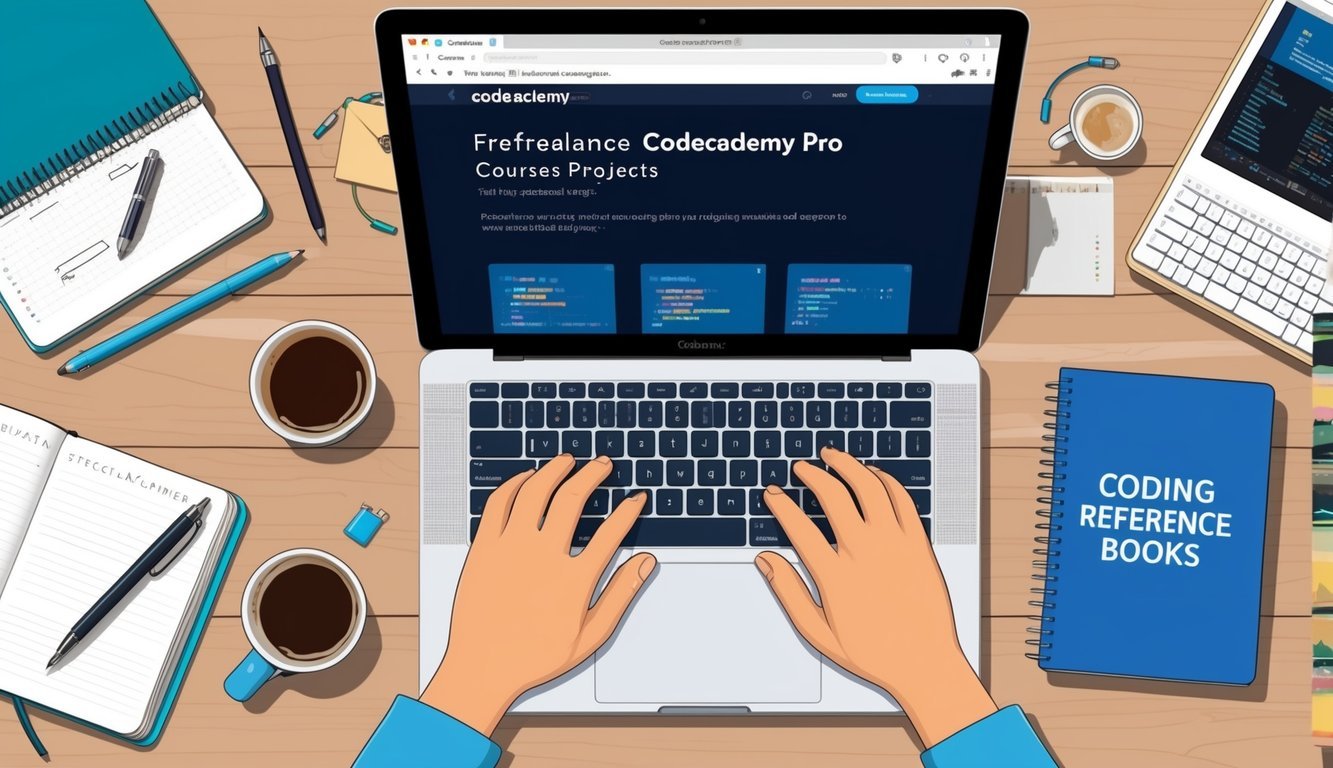
Codecademy Pro offers a wide range of courses to help you learn coding skills.
These courses cover various programming languages and topics, from web development to data science.
With a Pro membership, you gain access to exclusive content not available in the free version.
This includes interactive practice sessions and projects designed to reinforce your learning.
Codecademy Pro also provides Career Paths, which are structured learning tracks tailored to specific job roles.
These paths guide you through a series of courses to build the skills needed for your desired career.
The platform offers interview prep resources to help you prepare for job applications in the tech industry.
You’ll find practice questions and tips to boost your confidence during the hiring process.
Pro members can work on portfolio projects, allowing you to create tangible examples of your coding skills.
These projects can be valuable additions to your resume when seeking employment.
At $29.99 per month, Codecademy Pro is competitively priced compared to other online coding education platforms.
It offers unlimited access to its catalog of courses and features.
Some users find great value in Pro, while others suggest exploring free resources or books as alternatives.
The effectiveness of Codecademy Pro may depend on your learning style and goals.
2) LeetCode Challenges
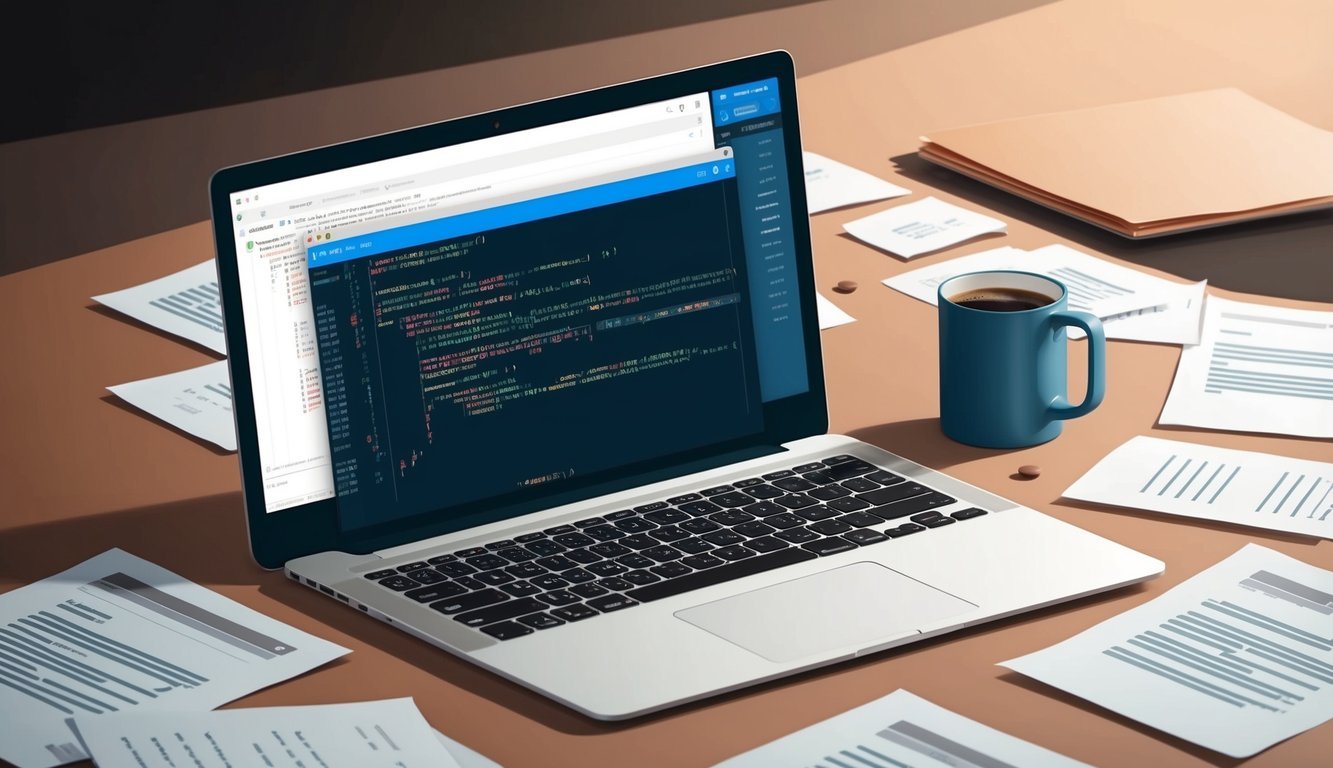
LeetCode offers a treasure trove of coding challenges to sharpen your skills.
You’ll find problems ranging from easy to hard, covering various algorithms and data structures.
These challenges simulate real interview questions from top tech companies.
By practicing regularly, you can boost your problem-solving abilities and coding speed.
LeetCode’s platform allows you to code in multiple programming languages.
You can submit your solutions and receive immediate feedback on correctness and efficiency.
Participating in LeetCode contests can be particularly beneficial.
These timed events push you to think quickly and apply your knowledge under pressure.
Remember to start with easier problems and gradually work your way up.
Don’t get discouraged if you struggle at first – persistence is key to improvement.
As you solve more problems, you’ll start recognizing common patterns.
This knowledge will help you tackle new challenges more effectively.
LeetCode also provides detailed solutions and discussions for each problem.
Take advantage of these resources to learn different approaches and optimizations.
Consider joining LeetCode’s community forums.
You can connect with other coders, share insights, and learn from their experiences.
By dedicating time to LeetCode challenges, you’ll build a solid foundation in algorithmic thinking.
This skill is invaluable for both freelance work and technical interviews.
3) GitHub Repositories
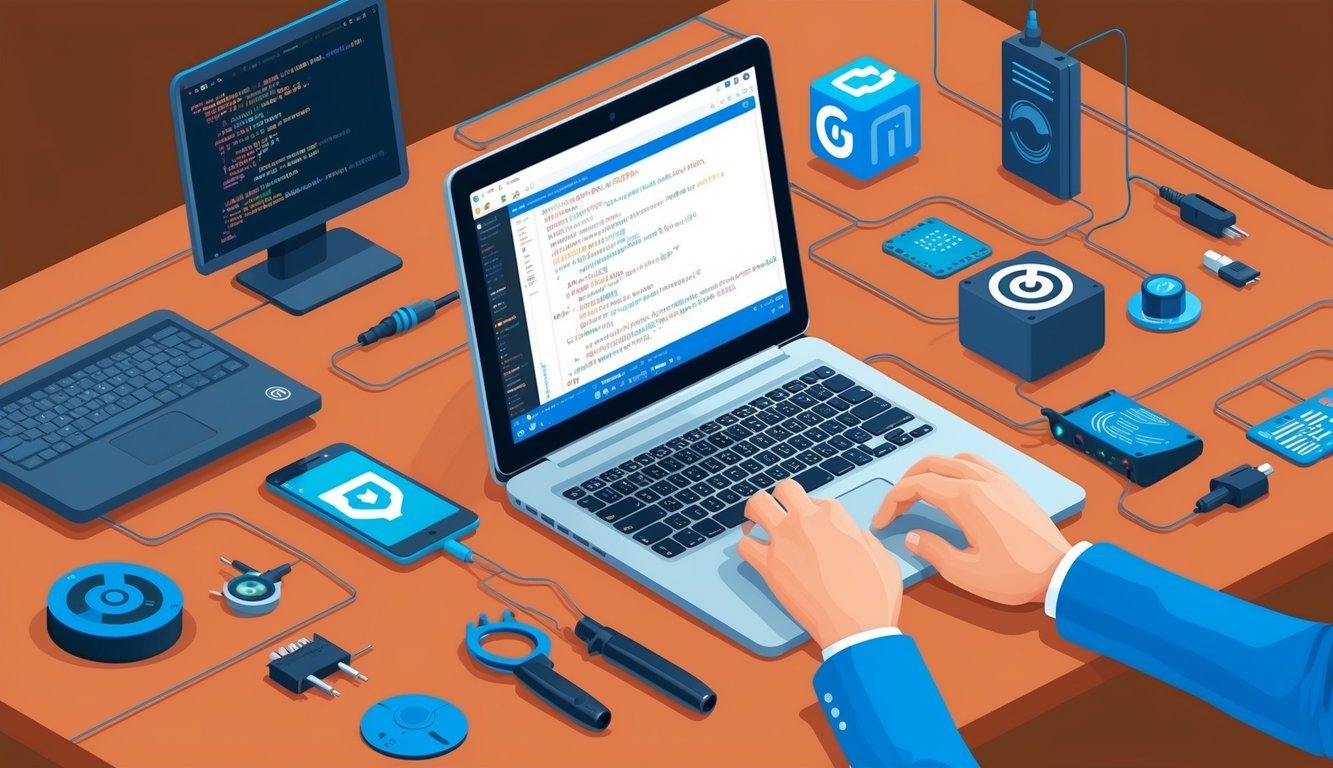
GitHub is a valuable platform for freelance coders and debuggers.
It offers a space to showcase your work and collaborate with others.
You can create repositories to store and share your code projects.
This allows potential clients to see your skills and expertise firsthand.
GitHub also provides version control, making it easier to manage different iterations of your projects.
You can track changes, revert to previous versions, and collaborate with others seamlessly.
Many freelancers use GitHub to contribute to open-source projects.
This can help you build your reputation and network within the coding community.
GitHub repositories can serve as a portfolio of your work.
You can highlight your best projects and demonstrate your problem-solving abilities to potential clients.
The platform also offers features like GitHub Pages, which allows you to host websites directly from your repositories.
This can be useful for showcasing your projects or creating a personal portfolio site.
You can use GitHub’s issue tracking system to manage bugs and feature requests for your projects.
This demonstrates your organizational skills and attention to detail to potential clients.
GitHub’s community features, such as discussions and pull requests, can help you connect with other developers and learn new skills.
This can be especially valuable for freelancers looking to expand their knowledge base.
Remember to keep your repositories well-organized and documented.
Clear README files and comments in your code make it easier for others to understand and appreciate your work.
4) Stack Overflow Solutions
Stack Overflow is a valuable resource for freelance coders and debuggers.
You can find answers to many common programming issues and bugs on this popular Q&A platform.
When you encounter a tricky problem, search Stack Overflow first.
Chances are someone has already asked about and solved a similar issue.
This can save you hours of debugging time.
If you can’t find an existing solution, don’t hesitate to ask your own question.
Be sure to provide a clear description of the problem and include relevant code snippets.
The Stack Overflow community is often quick to offer helpful suggestions.
Remember to give back by answering questions when you can.
This helps build your reputation and expertise.
You may even discover new clients through your Stack Overflow activity.
For complex projects, consider using Stack Overflow for Teams.
This private version allows you to collaborate securely with colleagues or clients on debugging tasks.
While Stack Overflow is incredibly useful, don’t rely on it exclusively.
Use it as one tool in your debugging toolkit alongside other techniques like rubber duck debugging and systematic code review.
5) “The Pragmatic Programmer” by Andrew Hunt

“The Pragmatic Programmer” is a must-read for any freelance coder or debugger seeking to enhance their skills.
Written by Andrew Hunt and David Thomas, this influential book has shaped software development practices for over two decades.
The book offers practical advice and timeless principles that can elevate your coding expertise.
It emphasizes the importance of continuous learning and adapting to new technologies, which is crucial in the ever-evolving field of programming.
You’ll find valuable insights on topics like code organization, debugging techniques, and best practices for software design.
The authors encourage a pragmatic approach to problem-solving, urging you to think beyond just writing code.
One of the book’s strengths is its focus on career development.
It provides guidance on how to become a more effective and efficient programmer, which can be particularly beneficial for freelancers managing their own projects and clients.
The 20th-anniversary edition, released in 2019, updates the original content with modern programming concepts and practices.
This ensures the book remains relevant in today’s tech landscape.
By applying the principles from “The Pragmatic Programmer,” you can improve your coding skills, increase your productivity, and deliver higher-quality work to your clients.
It’s a valuable resource that can help you stand out in the competitive world of freelance coding and debugging.
6) Udemy Python Bootcamp
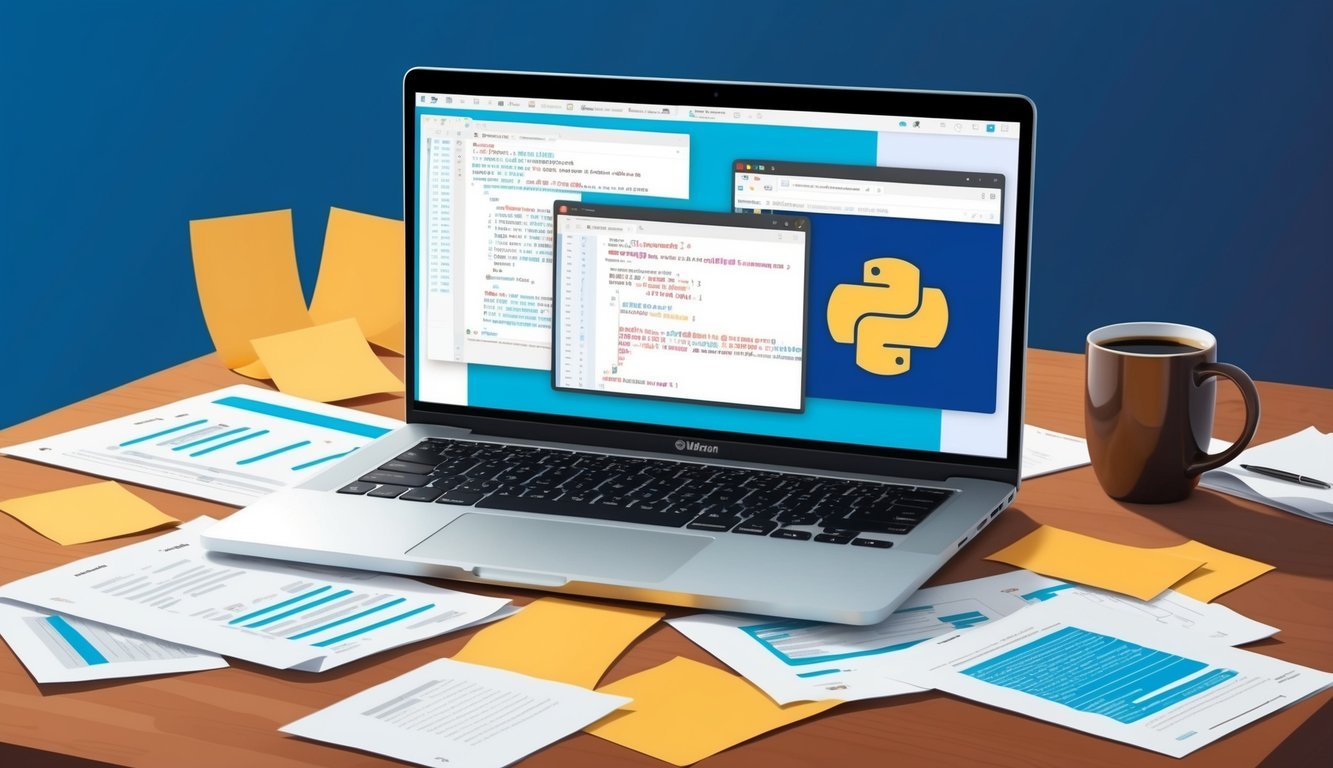
Udemy offers several popular Python bootcamps to help you master this versatile programming language.
These courses cater to various skill levels, from complete beginners to those looking to enhance their existing knowledge.
One standout option is “The Complete Python Bootcamp from Zero to Expert.” This comprehensive course takes you on a journey from novice to proficient Python programmer, regardless of your prior coding experience.
Another highly-rated choice is the “100 Days of Code: The Complete Python Pro Bootcamp.” This course follows a unique approach, encouraging you to code for one hour daily and build a project each day for 100 days.
These bootcamps cover a wide range of Python topics, including basic syntax, advanced features, and practical applications.
You’ll learn through a combination of lectures, coding exercises, and real-world projects.
By enrolling in a Udemy Python bootcamp, you can learn at your own pace and access course materials whenever it’s convenient for you.
This flexibility makes it an excellent option for freelancers looking to expand their coding skills.
Many of these courses boast high ratings and positive reviews from thousands of students.
They often include lifetime access to course materials and updates, ensuring you can revisit the content as needed.
Remember, consistent practice and hands-on coding are key to mastering Python.
These bootcamps provide the structure and resources you need to build a strong foundation in this in-demand programming language.
7) Front-End Mentor Challenges
Front-End Mentor offers a unique platform for honing your web development skills.
You’ll find a variety of real-world coding challenges that focus on HTML, CSS, and JavaScript.
These projects are designed to mimic professional workflows, giving you practical experience.
You can choose from different difficulty levels, starting with newbie-friendly tasks and progressing to more complex challenges.
As you work through the challenges, you’ll build a portfolio of projects that showcase your abilities.
This can be invaluable when applying for jobs or freelance gigs.
The platform provides professional designs for each challenge.
Your task is to bring these designs to life with your code.
This helps you practice translating visual concepts into functional websites.
One of the best aspects of Front-End Mentor is its community.
You can share your solutions, get feedback from others, and learn from different coding approaches.
This collaborative environment can significantly boost your learning.
The structured feedback system helps you identify areas for improvement.
You can also review other developers’ code, which is an excellent way to learn new techniques and best practices.
By participating in these challenges, you’re not just coding in isolation.
You’re joining a community of over 235,000 developers who are all working towards improving their skills.
8) Fiverr Gigs for Programmers
Fiverr offers a diverse marketplace for freelance programmers to showcase their skills and connect with clients.
You’ll find a wide range of coding and debugging services available on the platform.
As a programmer, you can create gigs offering your expertise in various programming languages like Python, JavaScript, Java, C++, and more.
Many developers on Fiverr provide services for web development, mobile app creation, and software debugging.
Pricing for programming gigs on Fiverr varies widely.
You can find services starting as low as $5, while more complex projects or experienced developers may charge higher rates.
Some gigs offer tiered pricing options to cater to different client needs and budgets.
When browsing for programming services on Fiverr, you can filter results by programming language, expertise level, and project type.
This helps you find the right developer for your specific needs.
If you’re a programmer looking to offer your services on Fiverr, it’s important to create a compelling profile and gig descriptions.
Highlight your skills, experience, and any relevant certifications to stand out from the competition.
As a client, you can review developer portfolios, ratings, and client feedback to make informed decisions when hiring.
Many programmers on Fiverr offer revisions and ongoing support as part of their services.
Remember that communication is key when working with freelance programmers.
Clearly outline your project requirements and expectations to ensure successful collaboration and delivery of your coding projects.
9) TopTal Freelance Developers
TopTal is a platform that connects businesses with top-tier freelance developers.
They claim to offer access to the top 3% of coding talent worldwide.
When you use TopTal, you’re tapping into a pool of highly skilled professionals.
These developers are vetted through a rigorous screening process that evaluates their technical skills and communication abilities.
TopTal’s freelancers specialize in various programming languages and technologies.
You can find experts in C++, Python, Java, PHP, and more.
This diversity allows you to match with developers who have the specific skills your project requires.
One standout feature of TopTal is their focus on real-time and multi-threaded systems.
If you’re working on complex software that demands high performance, you’ll find developers with the expertise to deliver.
Many TopTal freelancers have advanced degrees in fields like physics or machine learning.
This academic background can be invaluable for projects requiring deep analytical thinking or cutting-edge technology implementation.
TopTal also emphasizes security-first software development.
Their developers are trained to incorporate best practices throughout the development lifecycle, helping protect your software from potential cyber threats.
When you hire through TopTal, you’re not just getting a coder.
You’re partnering with professionals who can contribute to your project’s overall success.
They can collaborate with your existing teams and help streamline development processes.
10) HackerRank Contests
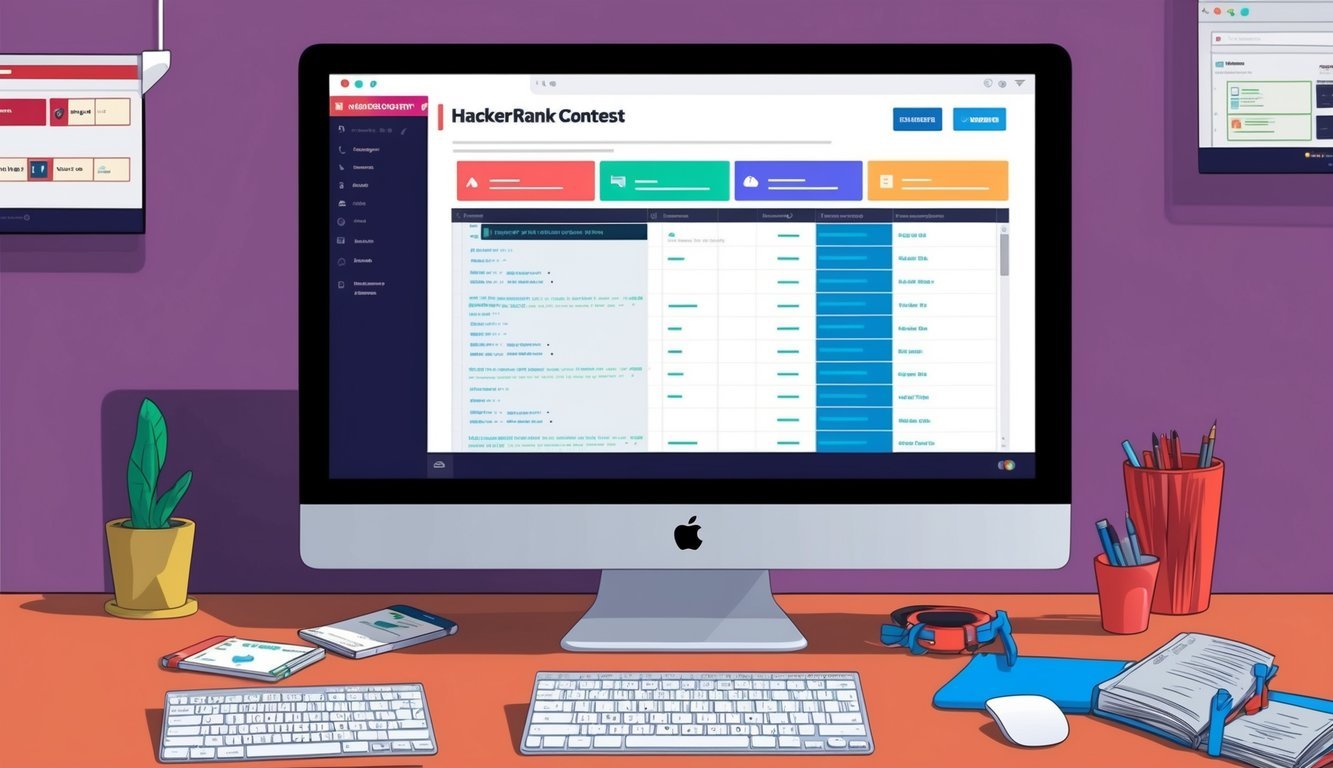
HackerRank hosts coding contests that attract programmers interested in algorithmic challenges, AI problems, and general programming.
These competitions provide an excellent opportunity for you to test your skills against thousands of developers worldwide.
By participating in HackerRank contests, you can sharpen your coding abilities and prepare for programming interviews.
The platform offers a diverse range of challenges, allowing you to tackle various problem-solving scenarios.
During contests, you’ll need to write complete programs to solve given problems.
It’s crucial to debug your code effectively using print statements or custom input values.
Remember to remove any debug statements before submitting your final solution.
Each coding challenge includes sample test cases to help you verify your code’s logic.
There are also hidden test cases that evaluate your solution’s performance and correctness.
Make sure your code passes all test cases for the best results.
HackerRank’s contest rules emphasize fair play.
Avoid discussing strategies during the competition, and refrain from plagiarizing code.
Such actions can lead to disqualification.
These contests are an excellent way to showcase your skills and connect with other developers.
You’ll gain valuable experience in problem-solving and time management, which are essential for freelance coding and debugging work.
Benefits of Freelance Coding
Freelance coding offers exciting opportunities for programmers seeking more control over their careers.
It provides a unique blend of professional growth and personal freedom.
Flexibility and Freedom
As a freelance coder, you can set your own schedule.
Work when you’re most productive, whether that’s early mornings or late nights.
You’re not tied to a 9-to-5 routine.
Choose your workspace too.
Code from home, a coffee shop, or while traveling.
This flexibility can lead to a better work-life balance.
You have the freedom to select projects that interest you.
Pick clients and technologies that align with your goals and passions.
Freelancing also means no daily commute.
Save time and reduce stress by eliminating rush hour traffic from your life.
Diverse Project Opportunities
Freelancing exposes you to a wide range of projects.
You’ll work with different industries, technologies, and challenges.
This variety keeps your skills sharp and up-to-date.
Each new project is a chance to learn and grow as a developer.
You can specialize in areas you enjoy or branch out to explore new technologies.
This diversity can make your work more engaging and prevent burnout.
Working with various clients helps build a robust portfolio.
You’ll gain experience faster than you might in a single full-time role.
Networking opportunities expand as you collaborate with different teams and individuals.
These connections can lead to future projects and career growth.
Effective Debugging Techniques
Debugging is a crucial skill for freelance coders.
Mastering effective techniques can save you time and frustration when tracking down elusive bugs in your code.
Identifying Common Errors
Start by reproducing the issue consistently.
This helps pinpoint the exact conditions that trigger the problem.
Pay close attention to error messages and stack traces – they often provide valuable clues about what’s going wrong.
Use print statements strategically to trace program execution and verify variable values at key points.
This simple technique can quickly reveal where things start to go awry.
Look for common culprits like off-by-one errors, null pointer exceptions, and incorrect logic in conditionals.
Check your data types and make sure you’re handling edge cases properly.
Utilizing Debugging Tools
Integrated development environments (IDEs) offer powerful built-in debuggers.
Learn to set breakpoints, step through code line-by-line, and inspect variables in real-time.
For web development, browser developer tools are invaluable.
Use the console to log messages and errors, and leverage the network tab to diagnose API issues.
Profiling tools can help identify performance bottlenecks in your code.
They show you where your program is spending the most time, allowing you to optimize critical sections.
Version control systems like Git can be surprisingly useful for debugging.
Use “git bisect” to find which commit introduced a bug, or compare different versions of your code.
Frequently Asked Questions
Navigating the world of freelance coding and debugging involves many considerations.
Here are some common questions to help you get started and succeed in this field.
How can I break into freelance web development?
Start by building a strong portfolio showcasing your best projects.
Take on small gigs through platforms like Upwork or Fiverr to gain experience.
Network with other developers and join online communities to find opportunities.
What are the going rates for freelance coding projects?
Rates vary widely based on experience and project complexity.
Junior developers might charge $30-50 per hour, while experienced professionals can earn $100-200+ hourly.
Research market rates in your niche to price competitively.
Where is the best place to find remote freelance coding jobs?
Popular platforms include Toptal, Freelancer.com, and LinkedIn.
Job boards like We Work Remotely and Stack Overflow Jobs also list remote opportunities.
Don’t forget to leverage your professional network for referrals.
What skills are most in-demand for freelance developers?
Full-stack development, mobile app creation, and cloud computing are highly sought after.
Proficiency in languages like JavaScript, Python, and React is valuable.
Soft skills like communication and project management are also crucial.
How do freelance coders and debuggers usually determine their salary?
Freelancers typically set hourly or project-based rates.
Consider your experience, skills, and living expenses when determining your rate.
Research industry standards and adjust based on project complexity and client budget.
Is it okay to hire someone specifically for debugging purposes?
Yes, many companies hire freelance debuggers to solve specific issues.
This can be a great opportunity for developers with strong problem-solving skills.
Before accepting debugging work, ensure you have a clear understanding of the project scope.


